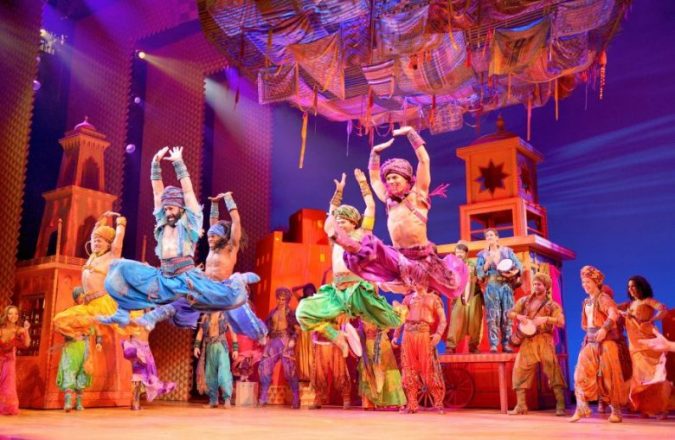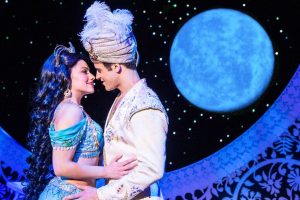
Disney’s Aladdin on tour. Academy of Music in Philadelphia, through July 1, 2018.
The most cheerful of all Disney theatrical properties is Aladdin. It’s a feel-good, smile-on-your-face show with elaborate production numbers and an exceptionally tuneful sore by Alan Menken.
The creative team was challenged by how to equal Robin Williams’s iconic interpretation of the genie on the film soundtrack. They cleverly transformed it into a new persona: a giant black genie with sassy attitude. This character dominates the Broadway version of Aladdin, now on a nationwide tour and playing at Philadelphia’s Academy of Music.
He commands the stage, serves as our master of ceremonies, and offers comments in asides to the audience.
The other great attraction of the show Aladdin is its thirteen high-quality Menken songs. The 1992 movie version included only six. Movie producers feel a need to restrain the number of songs because they slow down the action. As songwriter Stephen Schwartz (Disney’s The Hunchback of Notre Dame) told me in an earlier article, “In films you cannot have a character just stand still and sing. Something has to be moving, constantly, visually. If you’re going to write a ballad for an animated feature, the character better be going over a waterfall in a canoe.”
The movie eliminated the song “Proud of Your Boy” which is one of the most beautiful creations by Menken and his original lyricist, Howard Ashman. It’s restored in this stage version, and it serves as the primary motivation for everything Aladdin does. The tune is lovely as Ashman’s words say: “I’ll do my best, what else can I do? / Since I wasn’t born perfect like Dad or you / Mom I will try hard to make you / Proud of your boy.”
One of the main pleasures of Aladdin, for me, is following its musical development.
Ashman and Menken conceived of Aladdin as a buddy adventure like the Crosby & Hope Road movies and they wrote several songs before the producers decided the movie should be more of a love story between Aladdin and a princess. So production halted and the team turned their attention towards Beauty and the Beast. After Ashman died of AIDS in 1991 the studio returned to Aladdin and hired Tim Rice to write lyrics in partnership with Menken. The romantic “A Whole New World” was written by those two.
For the adaptation of Aladdin into a theater production in 2011, new songs were added by Menken and lyricist Chad Beguelin. In “These Palace Walls” Jasmine sings about becoming independent and making her own choices in a world where everything was decided for her by her father.
Menken’s music has more complexity than you might expect in such a frothy show. Genie shares the same musical motif as Jasmine, symbolizing his desire to also be free. This melodic theme is introduced in Jasmine’s first scene at the palace and later is expanded into the song “To Be Free.”
Other big moments in Aladdin are the Genie’s showpiece, “A Friend Like Me,” and the soaring “A Whole New World” where Aladdin and Jasmine take a magic carpet ride amidst twinkling stars. These are outstanding examples of stage wizardry. Elsewhere are many flamboyant dances and chase scenes, expertly staged by choreographer/director Casey Nicholaw as he retells the familiar Arabian Nights legend.
Walt Disney was known for a dark side in his creations, from Snow White to The Lion King. Aladdin lacks that sobering element; its villain is cartoonish. The show replaces that seriousness by presenting wacky action and hijinks from three companions of Aladdin who were in Ashman & Menken’s original concept, although in the movie they were replaced by the monkey Abu. Because the stage adaptation could not have a cartoon character, who is Aladdin going to talk to? So the three guys came back as comic relief and as his companions on his journey.
In this touring production, Michael James Scott visually resembles the Broadway original — tall, overweight, bald, black and athletic. He dominates every scene he’s in. Clinton Greenspan as Aladdin is charming with a sweet voice. Isabelle McCalla is actually an improvement over Broadway, with a rich voice and captivating personality as Jasmine. Jerald Vincent reveals an impressive baritone as the Sultan and Jonathan Weir is excellent as the villainous Jafar.
Bob Crowley designed the elaborate scenery, and Gregg Barnes the costumes. Brent-Alan Huffman leads a fifteen-piece band in Danny Troub’s orchestrations.
Below, McCalla and Greenspan:
